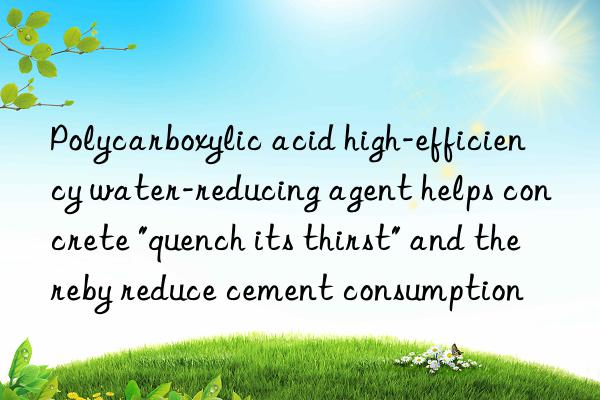
People’s requirements for the appearance quality of urban roads and bridges are becoming more and more stringent. The widespread use of admixtures, especially the birth of the third generation of polycarboxylate high-efficiency water-reducing admixtures, has comprehensively improved performance compared to the previous two generations. It has made a qualitative leap in terms of water reduction effect and technical performance. It has not only made a great contribution to the construction industry, but also has great benefits to bridges, railways and other industries. The main admixtures include water-reducing agents, retarders, air-entraining agents, etc., which greatly contribute to improving the performance of concrete.
Producing concrete requires a large amount of cement, and a large amount of carbon dioxide is emitted during the cement production process. At a technical seminar on green and environmentally friendly high-performance concrete admixtures, experts recommended the use of polycarboxylate superplasticizer to help "quench the thirst" of concrete, thereby reducing the amount of cement.
According to reports, the amount of concrete used in a certain area last year was 15 million cubic meters, and this year it has reached 18 million cubic meters. According to a professor at a polytechnic university, at least 250 kilograms of cement clinker are needed to produce 1 cubic meter of concrete, and the production of 1 ton of cement clinker will emit 1 ton of carbon dioxide. The increase in carbon dioxide emissions in the atmosphere is the root cause of global climate warming. To reduce pollutant emissions, it is necessary to reduce the use of cement as much as possible.
From the strength development trend, it can be clearly seen that for different types of cement, the early strength of concrete mixed with polycarboxylic acid develops rapidly and maintains a stable growth in later strength. The mechanical properties of both fresh concrete and hardened concrete. Polycarboxylic acid has relatively good adaptability to cement.
He said that on the one hand, in the process of producing concrete, slag, industrial waste, etc. can be used to replace part of the cement, which can reduce carbon dioxide emissions by 15% to 30%. On the other hand, in order to facilitate pouring, concrete needs to be diluted with water before use, and cement is also added to ensure its strength. Water-reducing admixture is an admixture that can reduce the necessary amount of water in concrete while meeting the specified consistency requirements and ensuring the strength of the concrete, thereby reducing the amount of cement used.
One of the characteristics of polycarboxylic acid superplasticizer is that the technical performance can be adjusted through "molecular structure design", especially the setting time can be adjusted by adjusting the side chain length of the polyoxyalkylene-containing chain link. ,
The carbonization performance of polycarboxylic acid admixtures has been improved to a certain extent compared with similar foreign products and naphthalene series high-efficiency water reducing agents. After adding polycarboxylic acid admixtures, the water consumption of concrete is greatly reduced, which has a beneficial effect on the form of cement hydration products and makes the concrete structure denser. In terms of mechanical properties, especially the compressive strength has been greatly improved, the carbon dioxide permeability has decreased, and the carbonization depth has also decreased.
Polycarboxylate high-efficiency water-reducing agent not only uses less amount, but also has good effect, is economical and reasonable, and has good improvements in concrete strength, durability, workability, etc. It is more effective than traditional naphthalene water reducing agent.
</p

 微信扫一扫打赏
微信扫一扫打赏

